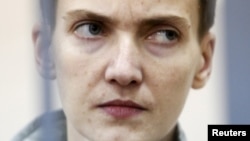A court in southwestern Russia has adjourned a preliminary hearing against captured Ukrainian pilot Nadezhda Savchenko to decide on her lawyers' request to move the trial to Moscow.
Prosecutors accuse the Ukrainian woman of causing the deaths of two Russian journalists in east Ukraine last year. They allege she acted as an aerial spotter to help Ukrainian ground forces target the journalists.
Savchenko’s lawyers and critics say Russian authorities are staging a political trial against the pilot, who became a symbol of Ukrainian unity and resistance to the Russia-backed rebels.
The pilot says she was abducted inside Ukraine in June of last year by pro-Russia rebels and forcibly taken to Russia. She denies any involvement in the journalists' deaths, and her lawyers say they have telephone records proving Savchenko was already in custody at the time the two journalists were killed.
Andrei Piontkovsky, a political scientist in Moscow, said the case against Savchenko is “completely fabricated.”
"She was abducted by Russian agents and brought to Russia,” he said. “And one of the accusations against her is 'illegal crossing of the Russian border.’”
Trial venue moved
Savchenko was shuttled out of Moscow two weeks ago to the Russian town of Donetsk, about 950 kilometers from Moscow and near the border with Ukraine.
Both Russia's Donetsk and the city of the same name in eastern Ukraine controlled by pro-Russia rebels take their names from the River Don which flows nearby.
Savchenko’s lawyers, who say they were unable to see her for two weeks, contend the trial was moved far from Moscow to avoid excessive publicity.
After adjournment of the preliminary hearing in Donetsk on Thursday, a response to their petition to return the case to Moscow is expected within 10 days.
A court spokeswoman in Russian Donetsk, Tatyana Diyeva, told reporters there the local judge agreed to the defense lawyers' request but that the petition now must be considered by a regional court in Rostov.
Hunger strike
Savchenko went on an 83-day hunger strike earlier this year to protest against her detention. Friends and family convinced her to eat again after her weight dropped significantly and her health deteriorated.
One of her lawyers, Mark Feygin, said Savchenko is not guilty of any crime.
“If it is good for propaganda purposes, then there should have been another suitable person chosen for victimization,” he said. “But not a person who is completely uninvolved with the crime."
Her lawyers hold some hope that the Kremlin may agree to swap Savchenko for Russian troops held in Ukraine, possibly Russian citizens Yevgeny Yerofeyev and Alexander Alexandrov.
After their capture in May in the Donbas region of eastern Ukraine, the pair allegedly admitted to Ukrainian authorities that they were on a military reconnaissance mission. Russian authorities say they are retired soldiers who were acting on their own.
Russia has consistently denied giving any military support to the rebels in Ukraine, despite persistent reports to the contrary.
To save face, political scientist Piontkovsky said Russian authorities likely would wait until Savchenko has been found guilty and sentenced.
"In spite of the fact that Moscow does not admit that these two officers ... are Russian military officers, nevertheless the situation is very embarrassing for them and the Kremlin would like to get them back,” he said.
Savchenko has become a cause célèbre in Ukraine. Last October she was elected in absentia to parliament, and later was nominated to represent Ukraine at PACE — the Parliamentary Assembly of the Council of Europe.
After a Ukraine cease-fire agreement was announced in February in Minsk, Ukraine’s President Petro Poroshenko optimistically announced Savchenko would be released as part of an exchange of prisoners.
But Moscow quickly shot down those hopes, declaring hers is a criminal case and that she was not detained illegally.
Russia’s presidential spokesman Dmitry Peskov has not commented on a possible prisoner swap. He told the Interfax news agency Thursday that the Kremlin has no influence on the investigation or the court.
The United Nations estimates the conflict in Ukraine has resulted in the deaths of more than 6,000 people since 2014, when Russia-backed rebels seized government buildings in the east and declared themselves independent of Kiev's rule.




